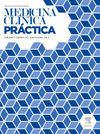¿La combinación dolutegravir y rifampicina en los pacientes no incluidos en los ensayos clínicos es también eficaz y segura en el binomio VIH-infección micobacteriana? Casos de la práctica clínica
Q4 Medicine
引用次数: 0
Abstract
Introduction
Mycobacterial infections and HIV is still a relevant topic. Rifampicin complicates antiretroviral drugs management, influencing the prognostic of both conditions. Dolutegravir is a first option drug, but rifampicin diminishes its levels. Doubling dolutegravir doses until two weeks after completing rifampicin treatment has good results. Our goal is to confirm in our daily practice the efficacy and safety of this scheme.
Methods
Eighteen HIV patients were included with mycobacterial infections. Rifampicin was administered with dolutegravir twice a day as commented. Viral suppression and mycobacterial curation were analyzed until the end of the follow-up.
Results
Thirteen from 18 were men, 46 years (interquartile range [IQR]: 38–49), diagnosed of HIV or treated since 1.8 years (IQR: 0.1–12), presenting mainly disseminated mycobacterial infections (11 of 18 cases). From which completed follow-up, 91.6% achieved mycobacterial curation (11 of 12) and 92.9% viral load suppression (13 of 14).
Conclusion
The treatment of rifampicin with adjusted dolutegravir doses seems to be a proper combination even in severe immunosuppresed population.
对于未纳入临床试验的患者,多鲁曲韦和利福平的联合用药在艾滋病毒-霉菌感染二联症中是否同样有效和安全?临床实践案例
导言:霉菌感染和艾滋病毒仍然是一个相关话题。利福平使抗逆转录病毒药物的管理复杂化,影响了两种疾病的预后。多鲁曲韦是首选药物,但利福平会降低多鲁曲韦的药效。在完成利福平治疗两周后再加倍使用多鲁曲韦,效果很好。我们的目标是在日常实践中证实这一方案的有效性和安全性。按照医嘱,利福平与多罗替韦同时使用,每天两次。结果18例患者中有13例为男性,46岁(四分位距[IQR]:38-49),确诊为艾滋病或接受治疗1.8年(IQR:0.1-12),主要表现为播散性分枝杆菌感染(18例中有11例)。结论即使在严重免疫抑制人群中,利福平与调整剂量的多鲁曲韦的治疗似乎也是一种合适的组合。
本文章由计算机程序翻译,如有差异,请以英文原文为准。
求助全文
约1分钟内获得全文
求助全文

 求助内容:
求助内容: 应助结果提醒方式:
应助结果提醒方式:


